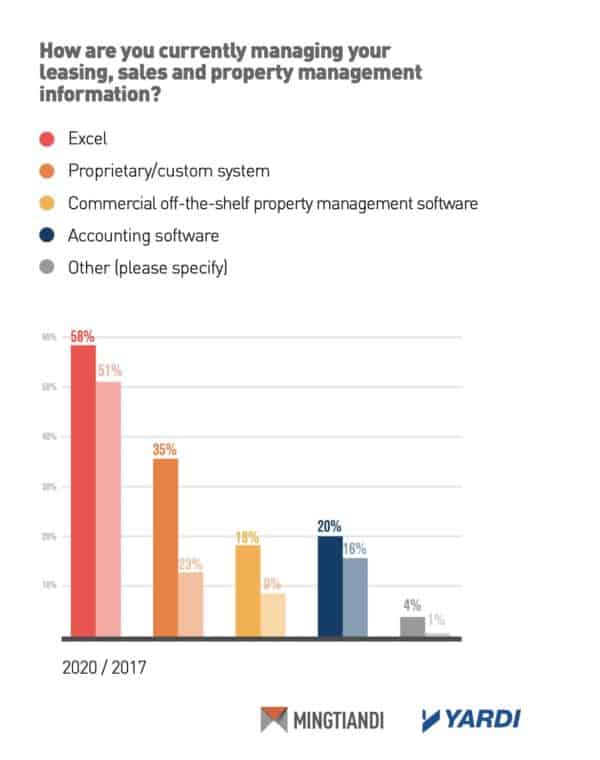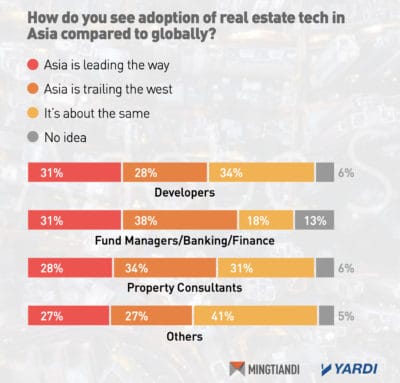The COVID-19 pandemic has jump-started proptech use at real estate businesses, with 60 percent of survey respondents saying the crisis led them to increase or enhance tech system adoption.
That finding comes from a poll of property industry executives conducted in the third quarter of 2020 by Mingtiandi as research for Tech Adoption in Asian Real Estate: The Pandemic Drives Innovation, a report set to be released at an event on 19 January.
Anthony Couse, CEO of JLL Asia Pacific, agrees that the coronavirus crisis has been an accelerator and catalyst for change as tools like air sensors and equipment to measure social distancing become must-haves.
“I don’t think post-COVID these are going to go away,” Couse told Mingtiandi in response to the report’s findings. “These are things that are going to stay in place to manage buildings in a much more progressive way.”
Enhancement Opportunity
When asked to describe the pandemic’s impact on their company’s adoption of technology, 44 percent of survey respondents said they had taken the opportunity for system enhancement, with 16 percent deciding to implement new systems altogether.

Just 10 percent said it was too early to tell, while 12 percent said there had been no change and 19 percent had stopped some or all projects.
Bernie Devine, regional director of property software and intelligence provider Yardi, which sponsored the study, says the pandemic has led to an increase in both companies expanding use of systems that they already have in place and firm’s adopting new tools to ensure that they have the latest solution.
“On the one hand, there is a perception that they have spare resources, they have some down time,” Devine said. “On the other hand, the senior management suddenly sees the need to fix things.”

In terms of re-evaluating systems, 27 percent of respondents said management had opted for the status quo and kept existing systems, but a solid 52 percent were considering a review of system functions and 21 percent had proceeded with a formal review.
Managing Information
With many corporates around the region still keeping their staff away from the office at the time that the survey was conducted, those polled were asked what changes to information management strategy and practices their company was likely to put in place in the wake of the COVID-19 crisis.
Some 42 percent said they were planning or considering investment in out-of-office collaboration tools, 39 percent were eyeing tools to simplify financial and management reporting under crisis conditions, and 41 percent were cutting paper-based systems in favour of online tools.
At the other end of the scale, 13 percent volunteered that they were simply muddling through and hoping that the crisis would end soon.
Chris Marriott, chief executive for Southeast Asia at Savills, sees the public health crisis driving acceptance of digital platforms, amplifying end-user demands for automation.
“In the world of agency and professional services, the online inspection has come of age, with brokers, valuers and clients accepting digital alternatives to in-person visits,” Marriott said. “If we were to look at property management, there’s now a greater demand from clients for contactless entry, and for managing who has access to buildings when, as well as being able to track that access. And tenants are pushing landlords and property managers to provide these capabilities.”
Collaboration Tools Taken Up
COVID-19 has put unprecedented limits on the ability to travel internationally, presenting new challenges for real estate firms in a region where cross-border commerce is a mainstream activity.
Across the Asia Pacific region, visitor arrivals were down 79 percent through the first eight months of 2020 compared with the same period of 2019, marking the steepest decline in travel of any region worldwide, according to statistics from the UN World Tourism Organization.
Asked about the effect of travel restrictions on their company’s approach to managing information, 73 percent of survey respondents said they had invested in video conferencing systems to improve remote communication, while smaller numbers had adopted digital signature systems for documents (17 percent) and VR or other online systems to enable remote sales (11 percent).
With regard to which tech tools or practices had the biggest impact on their business during the crisis, most respondents cited video conferencing (63 percent). Others credited communication apps like WeChat, WhatsApp, Slack and Microsoft Teams (28 percent) or online productivity suites (10 percent).
The survey was sent by email to Mingtiandi’s mailing list of 10,000 subscribers. A total of 180 respondents took part in the survey, which was open from 4 August to 21 August 2020.
Mingtiandi’s Tech Adoption in Asian Real Estate: The Pandemic Drives Innovation is set for publication in January 2021. Watch for the launch of the report here on MIngtiandi, and sign up for Mingtiandi’s proptech forum to see the report’s key findings discussed live.
Tech Adoption in Asian Real Estate: The Pandemic Drives Innovation, and Mingtiandi’s proptech forum are both graciously sponsored by Yardi.
Leave a Reply